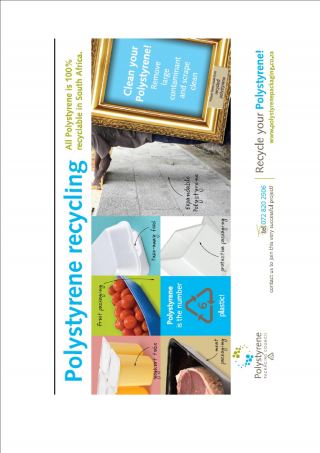South Africans Urged to Recycle their Polystyrene
What is white, light, considered of high value and, although made up almost entirely of air, is in very high demand? If you guessed polystyrene, you’d be 100% correct!
According to Adri Spangenberg, Director of the Polystyrene Association, expanded polystyrene is one of South Africa’s most commonly used materials relied upon by canteens and spaza shops owners and restauranteurs to keep their food or beverages hot or cold, as well as by retailers to protect high value items such as televisions or fridges owing to the material’s excellent insulation properties.
“Polystyrene, also known as Styrofoam, is also widely used by supermarkets to transport and pack their perishable food products such as meat, fruit and vegetables owing to the fact that polystyrene offers excellent insulation properties, extends the shelf life of food and protects its contents thus reducing spoilage or damage,” she explains.
Polystyrene consists of 96% air, which makes it incredibly lightweight. Whilst it is a positive attribute that greatly reduces carbon emissions during transportation, it also causes polystyrene products to easily be blown away by wind where it becomes visible litter found on beaches or along roadsides.
“Few people are aware that polystyrene is a valuable resource that is readily recycled in South Africa. Waste Management companies collect and supply post-consumer and post-industrial polystyrene products such as meat trays, hamburger clamshells and coffee cups to recyclers who use it to manufacture stationery, hangers, picture frames, cornices, curtain rods and skirtings. “In the most recent development it is mixed with a special cement mixture for use in building and construction,” Adri states.
Because of the development of these end-markets, the demand from recyclers currently outstrips the supply of the materials. To this end, South Africans are urged to remember to include their polystyrene into their clear recycling bags to prevent this valuable resource from ending up in landfills. Please remember to scrape or rinse your polystyrene before recycling it to ensure that all food left-overs have been removed. Recyclers readily accept all colours of products, including white, black, blue, yellow and pink.
“Polystyrene recycling has grown year-on-year to more than 4 200 tonnes last year, saving 162 350 000 litres of landfill space thanks to the various recycling projects. This is equivalent to 65 Olympic-sized swimming pools filled with polystyrene that was diverted from landfill, that at the same time helped to create more than 48 000 jobs in the plastics recycling industry. We are working tirelessly to ensure that recycling remains at the top of everybody’s environmental agenda and to raise awareness about the value of recycled polystyrene,” Adri concludes.
For more information about polystyrene recycling, visit www.polystyreneassociation.co.za


